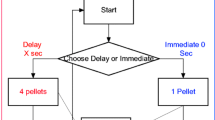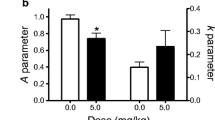Abstract
Rationale
The relationship between impulsive choice and cocaine use in humans has been well established, although the causal role between these variables is complex. To disentangle this relationship, studies using rats have focused on how acute or chronic cocaine alters impulsive choice. A predominance of studies has focused on chronic cocaine regimens, but few have assessed acute cocaine’s effects on impulsive choice.
Objective
The current study assessed if acute cocaine administrations alter delay discounting of rats in two common impulsive choice procedures.
Method
Baseline delay discounting rates were determined in female rats using both an increasing- and adjusting-delay procedure. Once stable, a range of acute cocaine injections (2, 5, and 15 mg/kg i.p.) was administered prior to both procedures.
Results
Baseline delay discounting rates were positively correlated between the increasing- and adjusting-delay procedures. Acute administrations of cocaine produced a dose-dependent decrease in preference for the large alternative in the increasing-delay procedure but had no effect in the adjusting-delay procedure.
Conclusions
The concordance of delay discounting rates across the two choice procedures suggests that both quantify the same underlying components of impulsive choice. However, manipulations that disrupt large alternative preference may not be readily detected under the adjusting-delay procedure unless control conditions are employed.



Similar content being viewed by others
References
Anker JJ, Carroll ME (2011) Females are more vulnerable to drug abuse than males: evidence from preclinical studies and the role of ovarian hormones. In: Neill JC, Kulkarni J (eds) Biological Basis of Sex Differences in Psychopharmacology, 1st edn. Springer Berlin Heidelberg, Berlin, pp 73–96
Anker JJ, Perry JL, Gliddon LA, Carroll ME (2009) Impulsivity predicts the escalation of cocaine self-administration in rats. Pharmacol Biochem Behav 93(3):343–348
Baird TJ, Gauvin DV (2000) Characterization of cocaine self-administration and pharmacokinetics as a function of time of day in the rat. Pharmacol Biochem Behav 65(2):289–299
Branch MN, Dearing ME (1982) Effects of acute and daily cocaine administration on performance under a delay-matching-to-sample procedure. Pharmacol Biochem Behav 16(5):713–718
Broos N, Diergaarde L, Schoffelmeer ANM, Pattij T, de Vries TJD (2012) Train impulsive choice predicts resistance to extinction and propensity to relapse to cocaine seeking: a bidirectional investigation. Neuropsychopharmacology 37(6):1377–1386
Coffey SF, Gudleski GD, Saladin ME, Brady KT (2003) Impulsivity and rapid discounting of delayed hypothetical rewards in cocaine-dependent individuals. Exp Clin Psychopharmacol 11:18–25
Colfax G, Coates TJ, Husnik MJ, Huang Y, Buchbinder S, Koblin B et al (2005) Longitudinal patterns of methamphetamine, popper (amyl nitrite), and cocaine use and high-risk sexual behavior among a cohort of San Francisco men who have sex with men. J Urban Health 82:62–70
Council NR (2011) Guidelines for the care and use of laboratory animals, 8th edn. The National Academic Press, Washington, DC
Craig AR, Maxfield AD, Stein JS, Renda CR, Madden GJ (2014) Do the adjusting-delay and increasing-delay tasks measure the same construct: delay discounting? Behav Pharmacol 25(4):306–315
Dandy KL, Gatch M (2009) The effects of chronic cocaine exposure on impulsivity in rats. Behav Pharmacol 20(5–6):400–405
de Wit H (2009) Impulsivity as a determinant and consequence of drug use: a review of underlying processes. Addict Biol 14(1):22–31
Evenden JL, Ryan CN (1996) The pharmacology of impulsive behaviour in rats: the effects of drugs on response choice with varying delays of reinforcement. Psychopharmacology 128(2):161–170
Fox AT, Hand DJ, Reilly MP (2008) Impulsive choice in a rodent model of attention-deficit/hyperactivity disorder. Behav Brain Res 187:146–152
Green L, Myerson J, Shah AK, Estle SJ, Holt DD (2007) Do adjusting-amount and adjusting-delay procedures produce equivalent estimates of subjective value in pigeons? J Exp Anal Behav 87:337–347
Heil SH, Johnson MW, Higgins ST, Bickel WK (2006) Delay discounting in currently using and currently abstinent cocaine-dependent outpatients and non-drug-using matched controls. Addict Behav 31:1290–1294
Hernandez G, Oleson EB, Gentry RN, Abbas Z, Bernstein DL, Arvanitogiannis A et al (2013) Endocannabinoids promote cocaine-induced impulsivity and its rapid dopaminergic correlates. Biol Psychiatry 75:487–498
Hoaken PN, Stewart SH (2003) Drugs of abuse and the elicitation of human aggressive behavior. Addict Behav 28(9):1533–1554
Kayir H, Semenova S, Markou A (2014) Baseline impulsive choice predicts the effects of nicotine and nicotine withdrawal on impulsivity in rats. Prog Neuro-Psychopharmacol Biol Psychiatry 48:6–13
Kirby KN, Petry NM (2004) Heroin and cocaine abusers have higher discount rates for delayed rewards than alcoholics or non-drug-using controls. Addiction 99:461–471
Kolokotroni KZ, Rodgers RJ, Harrison AA (2014) Trait differences in response to chronic nicotine and nicotine withdrawal in rats. Psychopharmacology 231(3):567–580
Logue AW, Tobin H, Chelonis JJ, Wang RY, Geary N, Schachter S (1992) Cocaine decreases self-control in rats: a preliminary report. Psychopharmacology 109(1–2):245–247
Madden GJ, Bickel WK (2010) Impulsivity: the behavioral and neurological science of discounting. APA, Washington, DC
Madden GJ, Johnson PS, Brewer AT, Pinkston JW, Fowler SC (2010) Effects of pramipexole on impulsive choice in male wistar rats. Exp Clin Psychopharmacol 18(3):267–276
Mazur JE (1987) An adjusting procedure for studying delayed reinforcement. Quant Anal Behav 5:55–73
Mazur JE (1988) Choice between small certain and large uncertain reinforcers. Anim Learn Behav 16:199–205
Mendez IA, Simon NW, Hart N, Mitchell MR, Nation JR, Wellman PJ, Setlow B (2010) Self-administered cocaine causes long-lasting increases in impulsive choice in a delay discounting task. Behav Neurosci 124(4):470–480
Mitchell MR, Weiss VG, Ouimet DJ, Fuchs RA, Morgan D, Setlow B (2014) Intake-dependent effects of cocaine self-administration on impulsive choice in a delay discounting task. Behav Neurosci 128(4):419–429
Myerson J, Green L, Warusawitharana M (2001) Area under the curve as a measure of discounting. J Exp Anal Behav 76:235–243
Paine TA, Dringenberg HC, Olmstead MC (2003) Effects of chronic cocaine on impulsivity: relation to cortical serotonin mechanisms. Behav Brain Res 147:135–147
Perry JL, Carroll ME (2008) The role of impulsive behavior in drug abuse. Pychopharmacology 200:1–26
Perry JL, Larson EB, German JP, Madden GJ, Carroll ME (2005) Impulsivity (delay discounting) as a predictor of acquisition of IV cocaine self-administration in female rats. Psychopharmacology 178:193–201
Perry JL, Nelson SE, Anderson MM, Morgan AD, Carroll ME (2007) Impulsivity (delay discounting) for food and cocaine in male and female rats selectively bred for high and low saccharin intake. Pharmacol Biochem Behav 86:822–837
Perry JL, Nelson SE, Carroll ME (2008) Impulsive choice as a predictor of acquisition of IV cocaine self-administration and reinstatement of cocaine-seeking behavior in male and female rats. Exp Clin Psychopharmacol 16:165–177
Robinson ESJ, Eagle DM, Economidou D, Theobald DE, Mar AC, Murphy ER et al (2009) Behavioural characterization of high impulsivity on the 5-choice serial reaction time task; specific deficits in ‘waiting’ versus ‘stopping’. Behav Brain Res 196:310–316
Roesch MR, Takahashi Y, Gugsa N, Bissonette GB, Shoenbaum G (2007) Previous cocaine exposure makes rats hypersensitive to both delay and reward magnitude. J Neurosci 27(1):245–250
Setlow B, Mendez IA, Mitchell MR, Simon NW (2009) Effects of chronic administration of drugs of abuse on impulsive choice (delay discounting) in animal models. Behav Pharmacol 20:380–389
Simon NW, Mendez IA, Setlow B (2007) Cocaine exposure causes long-term increases in impulsive choice. Behav Neurosci 121:543–549
Simon NW, Gilber RJ, Mayse JD, Bizon JL, Setlow B (2009) Balancing risk and reward: a rat model of risky decision-making. Neuropsychopharmacology 34:2208–2217
Stein JS, Madden GJ (2013) Delay discounting and drug abuse: empirical, conceptual, and methodological considerations. In: MacKillop J, de Wit H (eds) Handbook of Addiction Psychopharmacology, 1st edn. Wiley-Blackwell, Hoboken, pp 165–208
Winstanley CA, LaPlant Q, Theobald DEH, Green TA, Bachtell RK, Perrotti LI et al (2007) ΔFosB induction in orbiofrontal cortex mediates tolerance to cocaine-induced cognitive dysfunction. J Neurosci 27:10497–10507
Yi R, Mitchell SH, Bickel WK (2010) Delay discounting and substance abuse-dependence. In: Madden GJ, Bickel WK (eds) Impulsivity: the behavioral and neurological science of discounting, 1st edn. APA, Washington, DC, pp 191–211
Acknowledgments
The authors thank Drs. Andy Harris and Natalie Zlebnik for their comments on this manuscript, Clare Chamberlain, Adam Greer, Seth Johnson, Sarah Korthauer, Jared Mitchell, Amy Sakao, and Heather Veglahn for the technical assistance, and Dr. Krista Walkowiak, DVM, for veterinary care. Funding was provided by the National Institute on Drug Abuse (NIDA) grant P50 DA033942 (MEC) and a NIDA training grant T32 DA007097 (JRS—Dr. Tom Molitor-PI).
Author information
Authors and Affiliations
Corresponding author
Rights and permissions
About this article
Cite this article
Smethells, J.R., Carroll, M.E. Discrepant effects of acute cocaine on impulsive choice (delay discounting) in female rats during an increasing- and adjusting-delay procedure. Psychopharmacology 232, 2455–2462 (2015). https://doi.org/10.1007/s00213-015-3874-5
Received:
Accepted:
Published:
Issue Date:
DOI: https://doi.org/10.1007/s00213-015-3874-5




